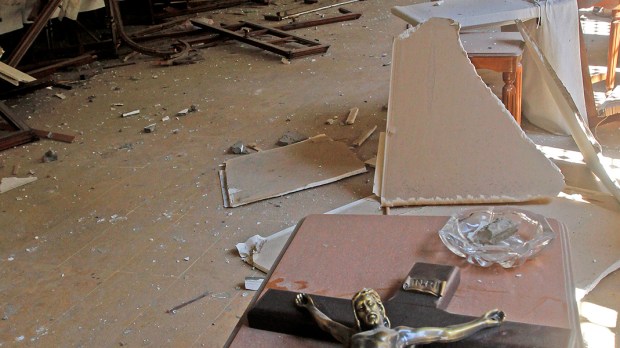Lenten Campaign 2025
This content is free of charge, as are all our articles.
Support us with a donation that is tax-deductible and enable us to continue to reach millions of readers.
When 2,750 tons of improperly-stored ammonium nitrate exploded at the port of Beirut, Lebanon, this past August, 27-year-old architect Nicole Sfeir felt it in her hometown, about 16 miles away. Sfeir was unemployed and contemplating going abroad. Instead, the urgent needs of fellow Lebanese led her to stay and help rebuild.
Through a Lebanese charity known by its French name, Offre Joie, Sfeir volunteer to help in the rebuilding of the parts of Beirut that suffered so much damage. She was assigned to a street in the hard-hit Karantina neighborhood. And there, according to a report in the Washington Post, she has been “fixated on a single particular site: the blasted-out Maronite Christian church.”
It is the hope of Sfeir and her 30-member team to have the church repaired in time for the Christmas Eve liturgy.
“She has been consumed by details of the century-old neighborhood landmark for weeks, from how to best reconstruct its sandstone walls to the ceiling’s intricate wooden arc. She has tried to incorporate more natural light for enhanced spirituality,” the Post said.
It’s an ambitious plan, but while working in the neighborhood and getting to know the residents who are trying to rebuild their lives, she has come to learn of the centrality of the religious building. Says the Post:
Her favorite moments are when residents stop by to ask about the church’s progress, reminding her of the community at the heart of it all. She admires how dedicated people are to the church, inquiring about it before the status of their own homes.
“There are people who on their own can’t get back up,” she said. “We are helping them stand.”
Challenges abound, not the least of which are with the Lebanese government itself. The article points out that about $2.5 billion is needed for reconstruction of the affected part of the city. So far only $5 million is available. The flow of funds might be easier were it not for the country’s banking crisis, which poses a challenge of accessing money from abroad.
In the view of another team member, Mohamad El Chamaa, 25, who is researching the Karantina neighborhood for his master’s degree at American University of Beirut, once the initial round of renovations are complete, the question will be whether residents will be able to afford to remain in their neighborhood.
The church “is an incentive for them to stay,” El Chamaa, who also volunteers with Offre Joie, told the Post. “But will they have the power to stay? We are trying to make it so they can.”

